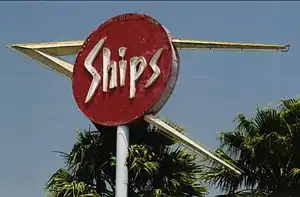Raygun Gothic
Raygun Gothic is a catchall term for a visual and architectural style that, when applied to retrofuturistic science fiction environments, incorporates various aspects of the Googie, Streamline Moderne and Art Deco architectural styles. Academic Lance Olsen has characterised Raygun Gothic as "a tomorrow that never was".[1] It is inspired by Space Age, raypunk and atompunk subcultures.

The style has also been associated with architectural indulgence, and situated in the context of the golden age of modern design due to its use of features such as "single-support beams, acute angles, brightly colored paneling" as well as "shapes and cutouts showing motion".[2]
Origin
The term was coined by William Gibson in his 1981 story "The Gernsback Continuum":[2][3]
Cohen introduced us and explained that Dialta [a noted pop-art historian] was the prime mover behind the latest Barris-Watford project, an illustrated history of what she called "American Streamlined Modern." Cohen called it "raygun Gothic." Their working title was The Airstream Futuropolis: The Tomorrow That Never Was.
— William Gibson, "The Gernsback Continuum"
Notes
- Olsen, Lance. "'The Future of Narrative': Speculative Criticism: or Thirteen Ways of Speaking in an Imperfect Tense". ParaDoxa. 4 (11): 375. Archived from the original on 2007-11-08. Retrieved 2007-11-03.
- "Raygun Gothic and Populuxe Culture: The Next American City, Today!". The Next American City. 2008-01-14. Archived from the original on 2008-02-21. Retrieved 2008-01-21.
- "The Gernsback Continuum" in Gibson, William (1986). Burning Chrome. New York: Arbor House. ISBN 978-0-87795-780-5.
4.^ "Loki"(2021).
References
- Alonso, Carlos (1998). Julio Cortázar. Cambridge: Cambridge University Press. ISBN 978-0-521-45210-6.